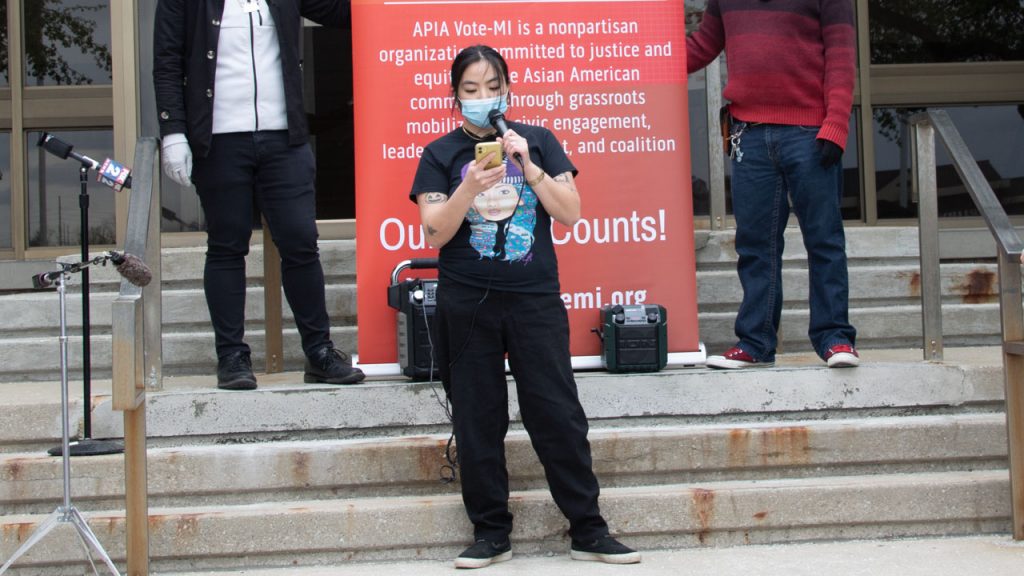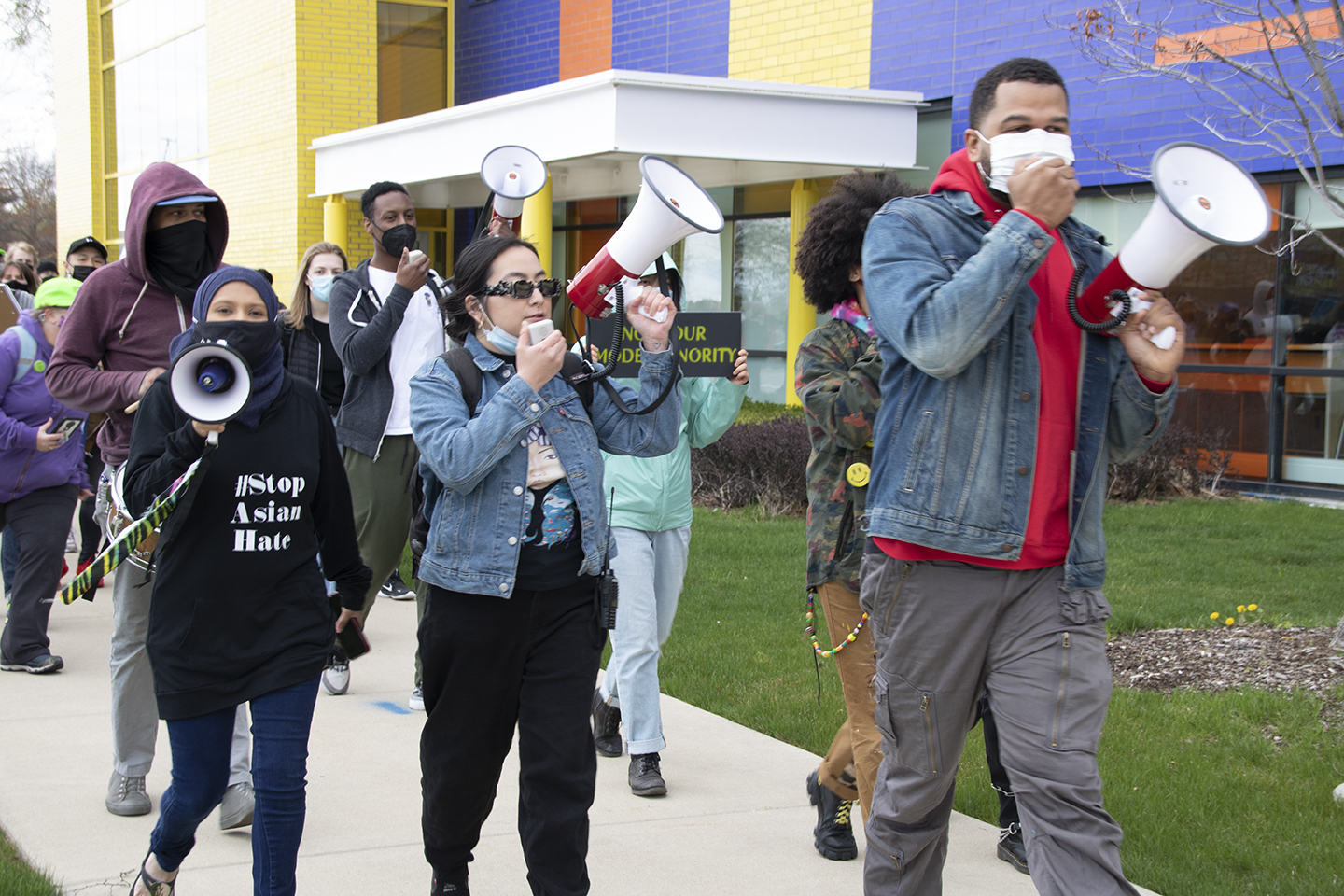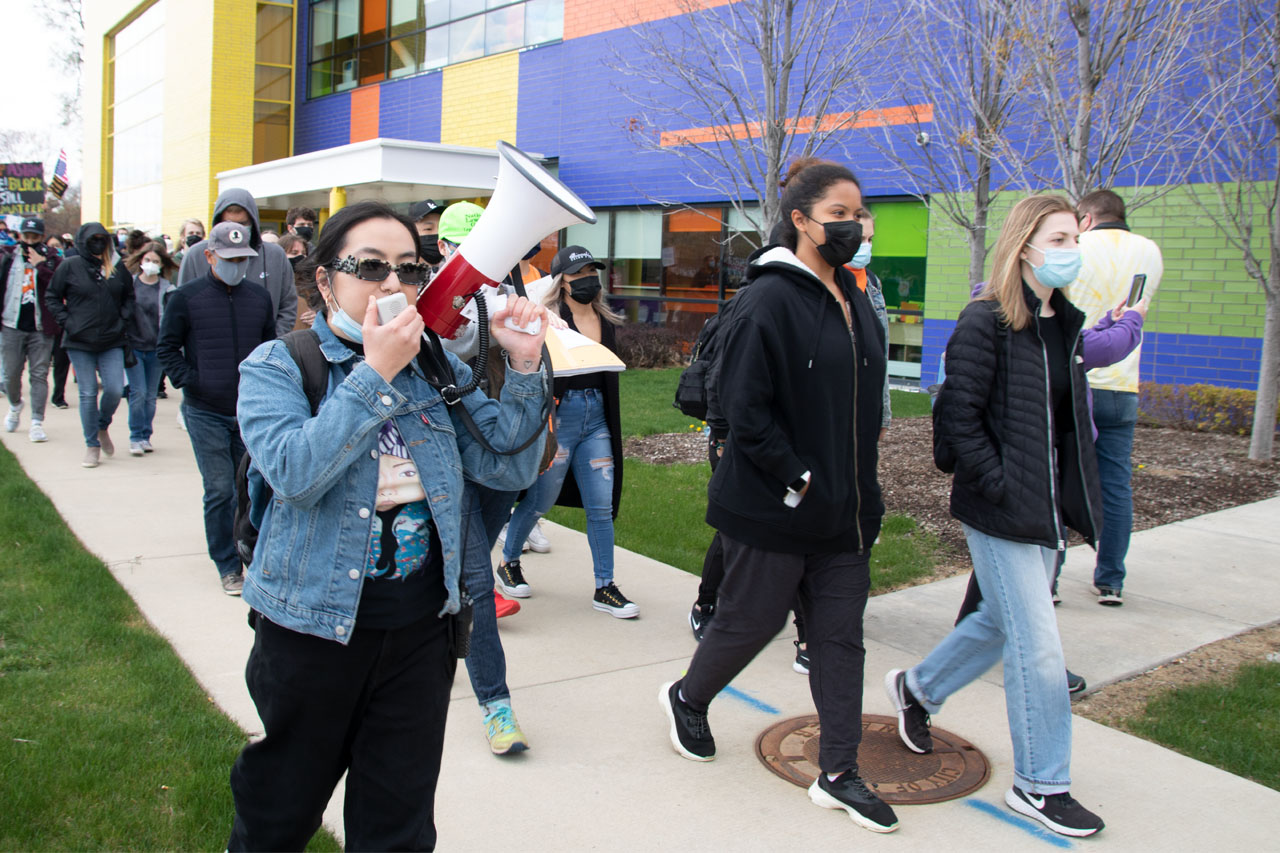This Young Asian American Activist Aims to Show Up in Solidarity for Communities of Color
Ceena Vang, co-founder of Whenever We’re Needed, says her organization started as one protest and has evolved into something bigger.

Whenever We’re Needed (WWN) means just that: Ceena Vang and Zora Bowens go whenever they’re needed.
The organization, founded by Vang and Bowens in the wake of the Atlanta spa shootings in March which killed six Asian women, aims to support Asian, Black and marginalized communities.
For Vang, a Hmong American whose mother and sister work in the beauty industry, the Atlanta shootings hit a little too close to home, she said at a rally WWN co-hosted with APIAVote-Michigan in Troy last month.
“We really do want to be showing up in solidarity, whenever we’re needed. Our values and our mission are intersectional.” — Ceena Vang, co-founder of Whenever We’re Needed
“The Atlanta shooting really hit home for me just as I’m sure it hit home for a lot of my Asian brothers and sisters. It could have been them. And it could have been me. And I can’t help but pray to God that they return home safely from a day of work,” she said.
She also talked about the fear and concern she has for her grandparents, with whom she is very close. In the past year, attacks on Asian Americans have soared. The national coalition Stop AAPI Hate says it has received more than 6,600 reported incidents of racism and discrimination targeting Asian Americans across the U.S. between March 19, 2020 and March 31, 2021.

“Within the Asian community, we hold very high regard for our grandparents,” she said. “My grandparents are survivors of COVID-19. Throughout the pandemic, I’ve only been able to FaceTime them, because I want to keep them safe. But tell me how their safety can be guaranteed when they leave their homes. The only time they leave the house is to go grocery shopping, or take a walk in the park around the neighborhood. But they can’t really even do either of those things without fearing for their lives.”
While she and her co-founder Zora Bowens started WWN as a response to the shootings, Vang wants to emphasize that there is a lot more work to do in pushing for justice and building power with other marginalized communities, such as participating in a march on May 22 in support of Palestinians.
“We really do want to be showing up in solidarity, whenever we’re needed,” she says. “Our values and our mission are intersectional. I don’t want anyone to get confused on what we’re doing, and asking us, ‘Why aren’t you guys doing anything for the Asian community?’ I don’t want anyone to think that we’re forgetting that. [There are] just so much things to focus on and so many things that are important that need to be highlighted, but we’re working on it.”
Vang recently spoke with WDET’s Dorothy Hernandez about WWN, what the organization is working on and why it’s important to organize in solidarity with communities of color. Read excerpts below, edited for clarity and brevity.
Listen: Ceena Vang talks about how Whenever We’re Needed grew from a protest into an organization working in solidarity with others to push for social justice.
WDET’s Dorothy Hernandez: At the Troy rally you had mentioned you had grown up in Troy, and that was your hometown. But you also talked about how even though Troy is one of the most Asian populated cities in Michigan, you kind of felt like an outsider. Can you talk a little bit about those feelings, and if there’s anything specific that sticks out in your mind is an example of that.
Ceena Vang, co-founder of Whenever We’re Needed: I feel like growing up in Troy, it almost felt like even the Asian community was kind of put up against one another. … It was difficult for me to make friends with other Asians because it seemed like they were also having a hard time identifying with their Asian-ness, just as I was. So we all had the same mindset to either keep to ourselves, or basically be friends with non-Asian classmates in order to fit in.
Hernandez: At the rally, you also mentioned you didn’t know whether it was a bad thing to be whitewashed or a compliment. Can you kind of talk a little bit about that, and your journey to embrace your Asian heritage?
Vang: I think that because I struggled with accepting and embracing my Asian-ness, growing up, I think that hearing from my white peers that “Oh, you know, you’re very whitewashed to me.” In my mind, it seemed more like a compliment at the time. But as I got older, I reflected back on a lot of it, and realized that it was more offensive than it was complimentary. I remember going to meet my friend in class one day, and it was a teacher that I didn’t have, so he didn’t know who I was. He heard me talking, and he said, “You speak English very well.” And I looked at him and was like, “Thanks, I guess, you know, I was born here in America. So I would assume that I speak English very well.” So it’s just the weird little hints of discredit for being Asian or not being Asian enough.
Hernandez: The AAPI community is so diverse. But something that I’ve heard a lot from people in the community, and also you said at the rally, is just the concern and fear for elders and their safety at this time. Can you talk a little bit more about this from your personal experience?
Vang: Yeah, I was just thinking about this the other day, too. It just doesn’t make any sense to me why our elders in our community are the ones that are being targeted. When you really think about it, it only makes sense because they are weak, and they’re frail, and they’re fragile, and they don’t know how to defend themselves. But at the end of the day, it’s like, why are our elderly being attacked? And for what reason? … So I wanted to highlight that a lot, especially in my speech at the Troy rally, because it’s been difficult for me to see my grandparents and I think that that’s something that everyone’s able to relate to is keeping our grandparents safe.
Hernandez: What led you to co-found WWN?
Vang: I would say that the, the initial start of WWN came from my partner Zora … she asked me how I felt about putting together a protest. We thought that it would just be something small and intimate, like amongst friends that we would get together. But the more we thought about it, we figured, let’s just make this big and invite a bunch of people. … I said, “Let me shoot a message to all my Asian friends, because what I want to do is make sure that the Asian community feels comfortable being out here during this time.” So once we got some feedback about it, that’s when we decided to put together the protest. And within a span of the three and a half days that we put it together, it became a lot larger than that. And to us, we thought we were just going to put together a protest. But then we realized we also started an organization while doing so … And we were also questioning like, what did we get ourselves into? But it’s been an amazing journey, the last two months.
Hernandez: I was watching on your Instagram, and Zora was talking about how the two of you want to do something in this moment with the Atlanta shootings, and then you talk a lot about intersectionality as an Asian woman and a Black woman fighting in solidarity together. Why is that important for communities of color to unite?
Vang: It’s important because at the end of the day, [for] people of color, our common enemy would be white supremacy being the reason for putting different communities of color against one another, to think that we are this way or that we hate one another. That’s something that Zora and I realized that her being a Black woman, me being an Asian woman, there’s a lot of anti-Black hate in the Asian community, and anti-Asian hate in the Black community. And we realize that it’s not that we actually hate each other, it’s the fact that we’ve been taught to hate each other. And these are things that some people won’t ever care to understand unless we really educate them.
Hernandez: Can you talk about the projects and collaborations you have coming up?
Vang: The first week of June we’ll be working with APIA Vote as well as (Association for Chinese Americans) and ACJ (American Citizens for Justice) for a community vaccine event to help people register to get their COVID shots at Rite Aid … And WWN is also going to be co-organize a workshop that will be aimed towards dismantling toxic masculinity and misogyny that men of color face.

Hernandez: It seems like you’re doing a lot of things that aren’t just focused on Asian American issues.
Vang: Yes. That’s one thing that I really want everyone to note too is that WWN, Whenever We’re Needed, we really do want to be showing up in solidarity, whenever we’re needed. Our values and our mission are intersectional. I don’t want anyone to get confused on what we’re doing, and asking us, ‘Why aren’t you guys doing anything for the Asian community?’ I don’t want anyone to think that we’re forgetting that. [There are] just so much things to focus on and so many things that are important that need to be highlighted, but we’re working on it.
Hernandez: What does Asian American mean to you?
Vang: When I think Asian American, I just think of someone who looks like me, who might have a different culture than me, but we all understand each other’s struggles at the end of the day. You could be Korean and I could be Hmong, but we still go through the same struggles when we look in the mirror, or when we leave our houses, or when we have arguments with our family members, even though we’re different entities.
Hernandez: What would you like others who are not Asian American to know about the work that you’re doing and the challenges that the AAPI community is facing right now?
Vang: Whether or not you’re a person of color, or whether or not you are Asian, I think it’s important for all of us to just take time … to not just educate ourselves, but, ask each other if we’re doing OK. Mental health is really important. And I think that we shouldn’t talk about something or mock oppression or pain that we’ve never experienced.
Trusted, accurate, up-to-date
WDET is here to keep you informed on essential information, news and resources related to COVID-19.
This is a stressful, insecure time for many. So it’s more important than ever for you, our listeners and readers, who are able to donate to keep supporting WDET’s mission. Please make a gift today.
